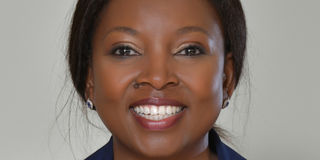Empowering women financially is key to spurring economic growth

Catherine Olaka, the Director HR & Administration, HF Group.
What you need to know:
- This theme underscores the importance of diversity and the empowerment of women across all sectors of society.
- Majority of women in Marsabit, Wajir, Samburu, Mandera, and Garissa spend up to seven hours of unpaid work per day
The theme for International Women's Day this year, "Invest in Women, Accelerate Progress”, serves as a poignant reminder for both Kenya and the world to intensify efforts toward achieving gender equality.
It calls upon everyone to dismantle barriers, challenge stereotypes, and foster environments where all women are valued and respected. This theme underscores the importance of diversity and the empowerment of women across all sectors of society.
Available data indicates that Kenya is making gradual strides in this direction, although the ultimate goal remains distant, especially in terms of financial inclusion.
The Time Use Survey by the Kenya National Bureau of Statistics (KNBS) in partnership with the State Department for Gender and Affirmative Action (SDfGAA), UN Women, and the World Bank, released in October last year, unearthed shocking revelations that women spend seven times more time on unpaid care work and domestic chores than their male counterparts.
The majority of women in Marsabit, Wajir, Samburu, Mandera, and Garissa, according to the survey, spend up to seven hours of unpaid work per day. Statistics from the International Labour Organization (ILO) also indicate that 75 percent of all unpaid care work globally is undertaken by women and girls.
This is disturbing because the contribution of these women spending hours on unpaid work on the GDP would be immense were they getting involved in gainful employment.
The Micro and Small Enterprises (MSEs) FinAccess Tracker Survey by the Central Bank of Kenya shows that women are already contributing immensely to the GDP of the country. The MSE sector accounts for 24 percent of GDP and offers employment opportunities to millions of Kenyans.
The FinAccess survey shows that women-owned MSEs have a higher survival rate. This is a clear indication that there is a need to invest more in women as a means of spurring the growth of the MSE sector. Unfortunately, women operating MSEs have limited access to credit, as most MSE owners rely on Chamas for loans to restock their businesses compared to their male counterparts who rely on mobile banking loans, according to a CBK report.
The report also reveals that businesses owned by women are less digitized compared to those owned by their male counterparts. Digitization of business enterprises plays a critical role in improving operational efficiency and value-proposition opportunities, coupled with quality decisions. Further, digitalization eases access to business records, facilitating better information exchange for purposes of audit, tax assessment, and credit scoring by financial institutions.
Unlike male-owned enterprises that take credit to pay salaries, studies have shown that female-owned MSEs take credit to acquire more supplies or expand business. The CBK survey also indicates that women are less skilled in their areas of trade compared to their male counterparts. To increase women's financial inclusivity, there is a big need for capacity building for women entrepreneurs.
Compelling evidence showcases women as powerful drivers of economic growth, contributing significantly to the Kenyan economy through entrepreneurial activities and labor market engagement. Additionally, women are known for their adeptness at saving and reinvesting income to enhance family well-being.
To enhance their economic opportunities, women require equitable access to education, improved job prospects, supportive business and legal environments, and a financial sector offering accessible and bespoke ssolutions.
A society that truly invests in women, should empower its women with unrestricted access to all financial services across various sectors such as insurance, banking, savings and credit institutions, pensions, capital markets, and mobile money markets, without encountering any gender-based obstacles.
The impact of recognizing women as a crucial market segment is underscored by the famous quote “Give a woman a dollar, and she can put it to good use. Teach her about how money works, and she can change the world."
The writer is Catherine Olaka, Director HR & Administration, HF Group.



